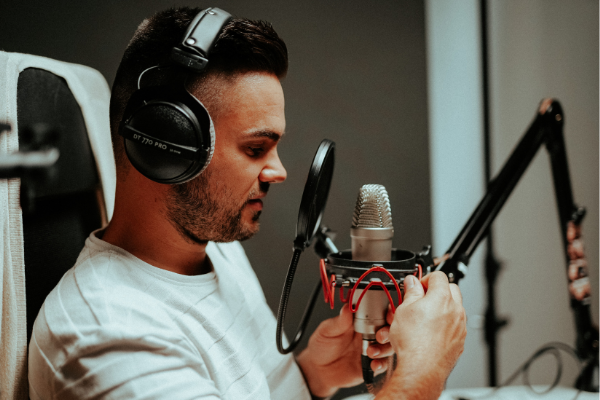When looking for the perfect sales tool for your business, you’re probably not thinking about podcasts. In fact, podcasts are probably one of the last things that come to mind. But with 424.2 million podcast listeners globally as of 2022, you might want to reconsider these notions.
There are many benefits to starting a podcast. In our 10-plus years of experience, we’ve helped clients produce podcasts to raise brand awareness, engage their audience, start conversations with prospects, and increase their bottom line.
But achieving those results means doing it just as strategically as your other sales and marketing activities. That’s where hiring an expert podcast producer can go a long way.
Marketing teams and entrepreneurs who’ve mastered podcasting as a sales tool have become household names. A clear example is HubSpot, a marketing software company that has built a whole podcast network as part of its strategy. Then, individuals like Alex Hormozi and Rich Webster use their own podcasts to promote their services. Unlike them, there are plenty of entrepreneurs who hit common pitfalls and often give up, frustrated.
Maybe you’ve fallen for the flawed assumption that you need a large audience to create a successful podcast. After all, most people believe podcast success is defined by the number of listeners or downloads.
This couldn’t be further from the truth. Here’s why.
Podcasts are the perfect tool for building trust and relationships.
Every week, I receive at least a handful of cold sales pitches through DMs, emails, calls, etc. I hate them, and I am sure your audience does, too. I also hate ads, and the fact that approximately 42% of internet users have ad blockers installed shows that I am not alone.
As audiences, we’re becoming increasingly resistant to traditional sales and marketing. Today’s customers want you to add value to their lives. They want to be part of the conversation, not just sold to.
That’s where podcasts come in.
Podcasting can earn you a share in the attention economy.
To win and maintain audience attention and trust, you have to deliver value through authenticity. That means making them feel like they are part of the conversation and sharing content they are actually interested in listening to.
A clear example of this is EOS Worldwide’s approach to the Rocket Fuel and We Run on EOS podcasts, which we produce for them. By actively inviting EOS Worldwide’s clients as podcast guests, they strengthen relationships and share what it’s like to implement the EOS system with listeners who could be future clients.
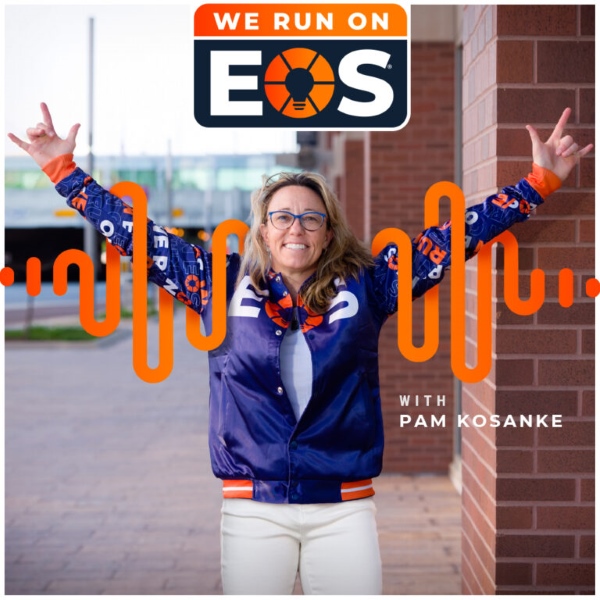
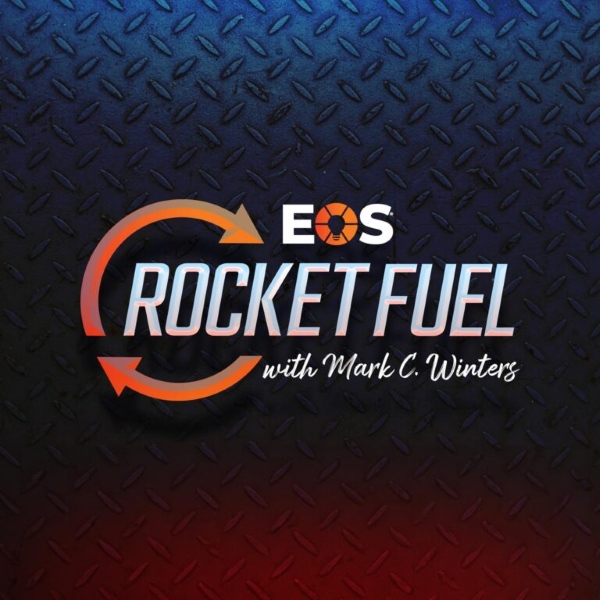
As you can see, a great podcast doesn’t push your product or service in an obvious way. Instead, it gives your listeners access to knowledge and stories. And in the best case, it helps you establish and grow a parasocial relationship with your audience.
Podcasting complements your outbound marketing strategy.
Compared with outbound sales and marketing tactics, podcasting stands out as leveraging a different dynamic altogether. One that changes the rules of engagement for the better.
Instead of thinly veiled product promos, ambush marketing, and desperate elevator pitches, podcasting provides a more organic medium for transferring value and even entertainment, free from in-your-face marketing agendas, as long as you create valuable content.
And if you want to create valuable content through a podcast, you need to understand your audience, their needs, and their thought process. This type of audience research makes your podcast more valuable, so more of your target audience wants to listen to it, which enables sales.
Podcasting can add authenticity to your brand touchpoints when positioned alongside more traditional marketing tactics. Once your podcast audience buys into your podcasting narratives, they’re more likely to trust and buy into other messages received in other marketing channels.

6 Ways podcasting overcomes the drawbacks of interruption marketing.
1. Podcasts aren’t overtly about sales.
Think of why you listen to your favorite podcasts. Maybe it’s because they teach you new, cool things. They stimulate new insights that change you for the better. Or perhaps it’s because they are simply entertaining. Maybe it’s all of the above.
It’s exactly for those reasons—and others—that podcasting brings so much value to lead generation and personal branding. By delivering meaningful experiences, podcasts engage your audience emotionally, helping keep you front-of-mind as a source of value.
Podcasts allow your audience to hear your voice and engage intimately with you, your business, and what you’re all about, without having to put up the “I’m being sold to” defenses.
2. Podcasts are accessible and flexible.
With podcasting, you can listen for free on any device, anywhere, and at any time. If someone downloads the podcast, you don’t even need an internet connection. So your audience can listen to them on their terms.
3. Podcasts are ‘opt-in.’
In other words, when an audience listens to or watches your podcast, they’ve actively decided to participate. It’s the complete antithesis to interruption marketing.
4. Podcasts can be listened to in installments.
Once someone has opted into a podcast, they can opt out anytime.
From a brand-building and sales perspective, that means a higher message impact. Your audience chooses to tune in, perhaps regularly, when they’re in the right headspace to listen.
5. Podcasts are ubiquitous and incredibly accepted.
Name a topic. Whatever you just thought of, there’s probably a podcast about it. That means countless possible niches and demographics with an appetite to tune in, listen, and learn.
As the podcaster, you need to know what’s important to your audience and how to curate a podcast narrative that doesn’t stink of overt self-promotion.
For example, Motivations AI has a series of personality tools and assessments that are perfect for coaches. Instead of creating a podcast about personality tools, which would quite frankly be boring, we produced the Coach Factory podcast in partnership with them. This podcast provides the perfect opportunity to interview and build relationships with their ideal customers.
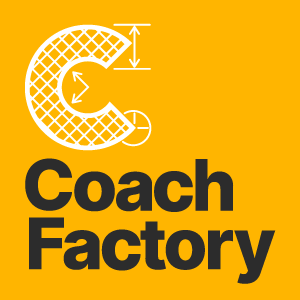
6. Podcasts create authentic intimacy.
When you watch CNN or view an ad or social media post, you’re listening or scanning for biases because you automatically assume the speaker’s or ad’s intentions. These are scripted mediums, after all.
By contrast, the best podcast narratives are natural, organic, sometimes live, long-form, and perhaps even blemished with occasional errors.
This is one of the biggest reasons people love podcasts and why they can be powerful for building trust with your audience.
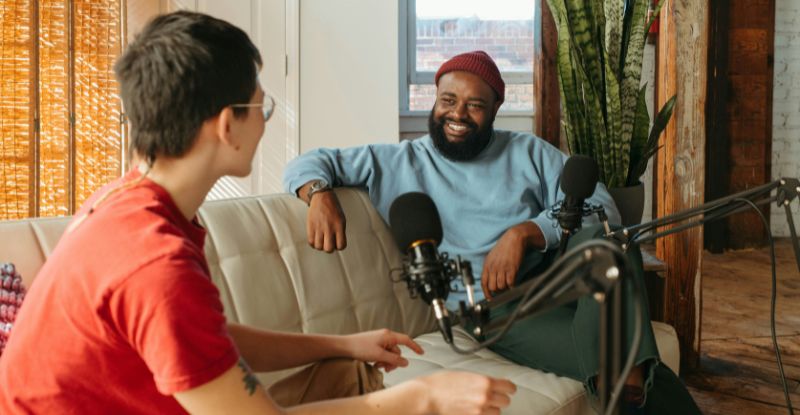
Making podcasting part of your general marketing strategy.
Ultimately, podcasting can be a great tool for your sales and marketing team, as long as you have the right production, planning, and positioning. It is a job that can’t be rushed, and you must put in the hours to add legitimate, authentic, and consistent value to listeners without expecting something back immediately.
If you make it part of your omnichannel marketing strategy and stick to it long enough, your audience will trust and choose you. And if you don’t want to do it alone, reach out to us. We’ll do all the podcast heavy lifting so you can focus on all the other important matters in your business.

